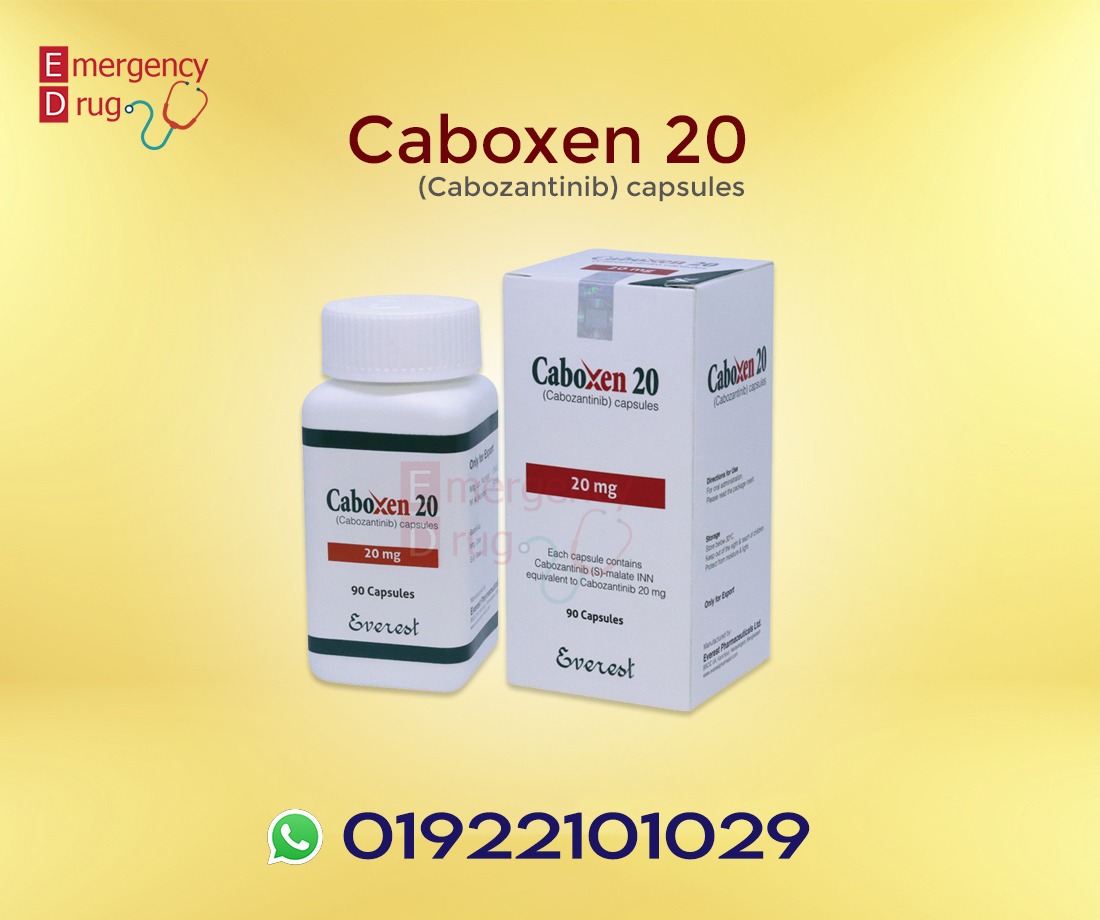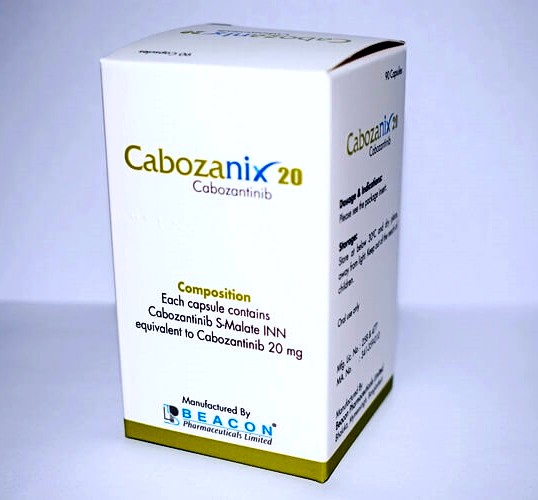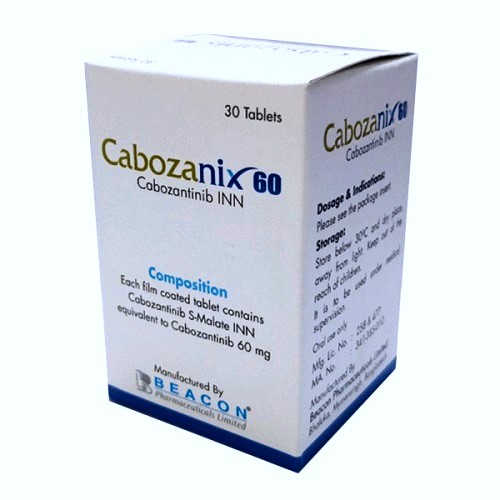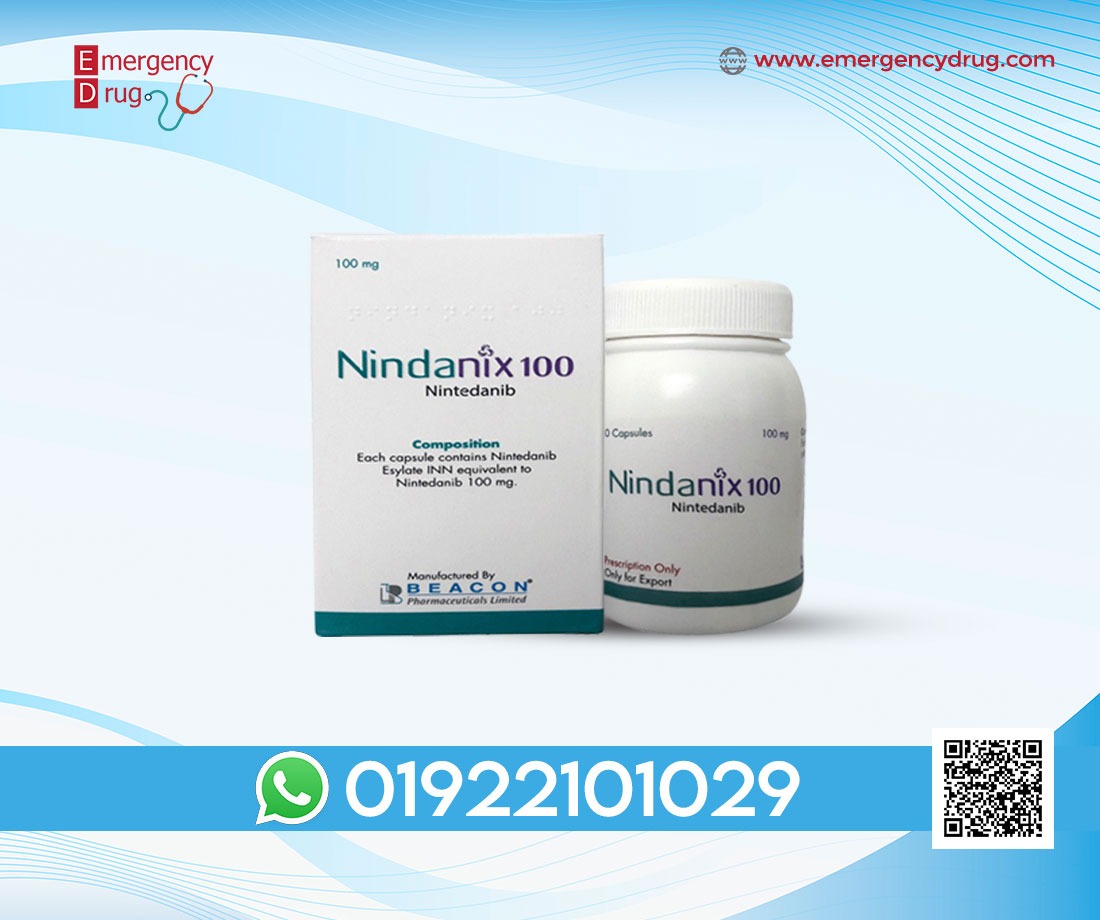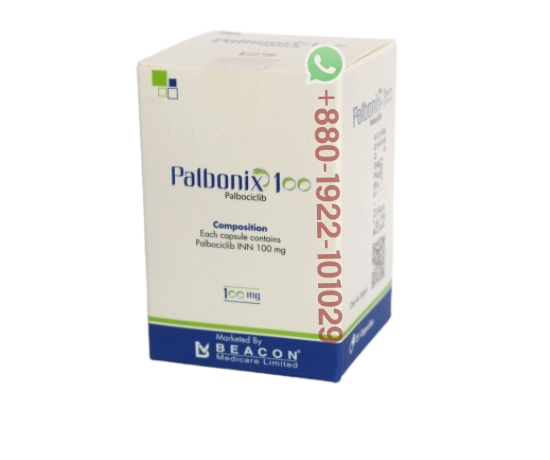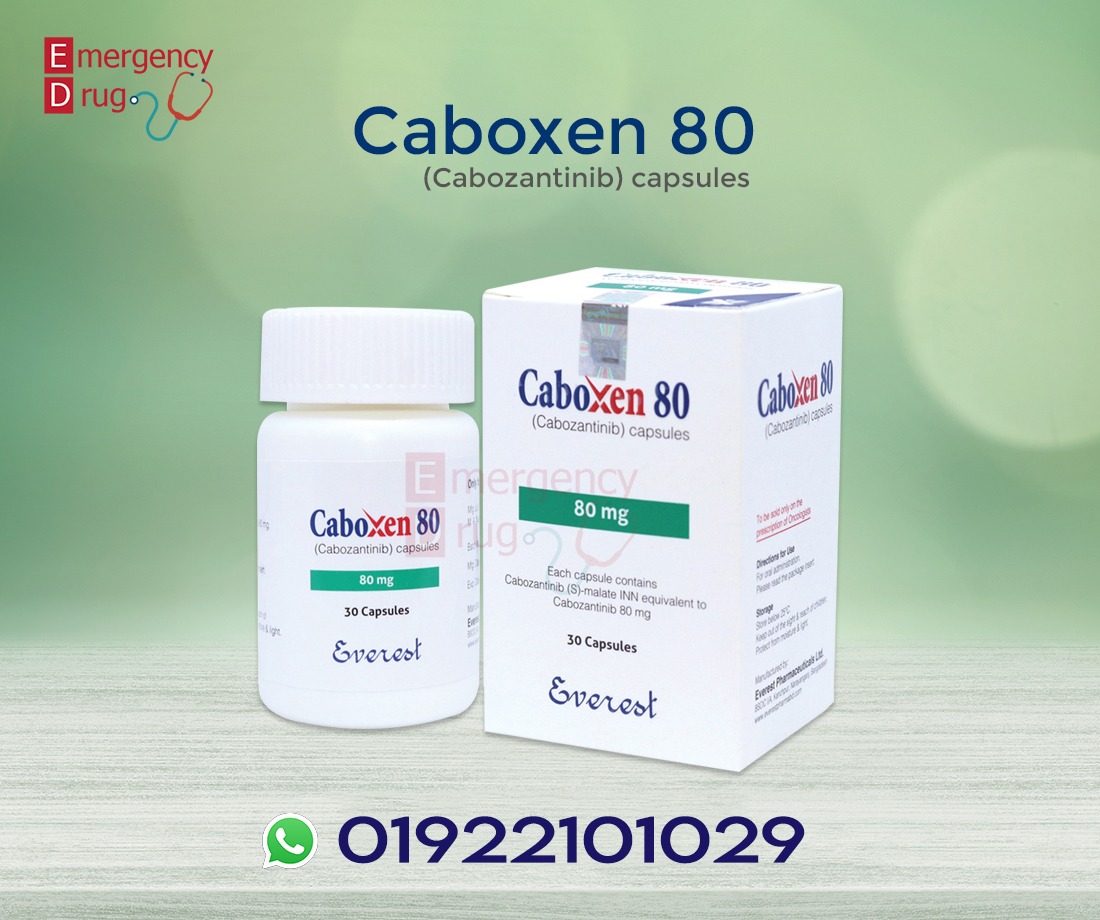
Caboxen (Cabozantinib) 80 MG – 30 Capsules
Price: $225.00
Cabozantinib is a targeted therapy. It is an oral receptor tyrosine kinase inhibitor. Cabozantinib treats metastatic medullary thyroid cancer (MTC), advanced renal cell carcinoma, and patients with hepatocellular cancer (HCC) who have previously received sorafenib.


Description
Cabozantinib is a targeted therapy. It is an oral receptor tyrosine kinase inhibitor. Cabozantinib treats metastatic medullary thyroid cancer (MTC), advanced renal cell carcinoma, and patients with hepatocellular cancer (HCC) who have previously received sorafenib.
Indications:
Cabozantinib is used:
- To treat advanced renal cell carcinoma (RCC; a type of cancer that begins in the cells of the kidneys).
- In combination with Nivolumab (Opdivo) to treat advanced RCC in patients who have not yet received treatment for RCC.
- To treat hepatocellular carcinoma (HCC; a type of liver cancer) in people previously treated with sorafenib.
- Treat a specific type of thyroid cancer in adults and children 12 years of age and older that has spread to nearby tissues or other parts of the body has not responded to previous a treatment and cannot be treated with radioactive iodine.
Pharmacology:
In vitro biochemical and cellular assays have shown that Cabozantinib inhibits the tyrosine kinase activity of MET, VEGFR-1, -2 and -3, AXL, RET, ROS1, TYRO3, MER, KIT, TRKB, FLT-3, and TIE-2. These receptor tyrosine kinases are involved in both normal cellular function and pathologic processes such as oncogenesis, metastasis, tumor angiogenesis, drug resistance, and maintenance of the tumor microenvironment.
Absorption: Median time to peak Cabozantinib concentrations ranged from 3 to 4 hours post-dose. A 19% increase in the Cmax of Cabozantinib compared to a Cabozantinib capsule formulation was observed following a single 140 mg dose. A less than 10% difference in the AUC was observed between Cabozantinib and a Cabozantinib capsule formulation.
Distribution: The oral volume of distribution (Vz/F) of Cabozantinib is approximately 319 L. It is highly protein-bound in human plasma (≥99.7%).
Elimination: The predicted terminal half-life is approximately 99 hours, and the clearance (CL/F) at a steady state is estimated to be 2.2 L/hr.
Metabolism: It is a substrate of CYP3A4 in vitro.
Excretion: Approximately 81% of the total administered radioactivity was recovered within a 48-day collection period following a single dose of radiolabeled 14 C- Cabozantinib in healthy subjects. Approximately 54% was recovered in feces and 27% in urine. Unchanged Cabozantinib accounted for 43% of the total radioactivity in feces and was not detectable in urine following a 72-hour collection.
Dosage & Administration:
Recommended Dosage for Renal Cell Carcinoma: The recommended dosage is 60 mg once daily without food until the patient no longer experiences clinical benefit or experiences unacceptable toxicity.
Recommended Dosage for Hepatocellular Carcinoma: The recommended dosage is 60 mg daily without food until disease progression or unacceptable toxicity. Or as directed by the registered physicians.
- Stop treatment with Cabozantinib at least 28 days before the scheduled surgery, including dental surgery.
- Do not substitute tablets with Cabozantinib capsules.
- Do not administer with food. Administer at least 1 hour before or at least 2 hours after eating.
- Swallow tablets whole. Do not crush tablets.
- Do not take a missed dose within 12 hours of the next dose.
- Modify the dose for certain patients with hepatic impairment and for patients taking drugs known to induce or inhibit CYP450 strongly.
Interaction:
Strong CYP3A4 Inhibitors: Coadministration of a Cabozantinib capsule formulation with a potent CYP3A4 inhibitor increased the exposure of Cabozantinib, which may increase the risk of exposure-related adverse reactions. Avoid coadministration with strong CYP3A4 inhibitors. Reduce the dosage if coadministration with potent CYP3A4 inhibitors cannot be avoided. Avoid grapefruit or grapefruit juice which may also increase the exposure to Cabozantinib.
Strong CYP3A Inducers: Coadministration of a Cabozantinib capsule formulation with a strong CYP3A4 inducer decreased the exposure of Cabozantinib, which may reduce efficacy. Avoid coadministration of Cabozantinib with strong CYP3A4 inducers. Increase the dosage of Cabozantinib if coadministration with strong CYP3A4 inducers cannot be avoided. Avoid St. John’s Wort which may also decrease the exposure of Cabozantinib.
How Cabozantinib is given:
- Cabozantinib is a pill taken by mouth.
- Take Cabozantinib on an empty stomach. Do not eat for at least 2 hours before and at least 1 hour after taking Cabozantinib.
- It would be best if you did not drink grapefruit juice or eat grapefruit during treatment with Cabozantinib. It may change the amount of Cabozantinib in your blood.
- Take Cabozantinib precisely as prescribed.
- Swallow Cabozantinib capsules whole with at least 8 ounces of water. Do not crush, dissolve or open capsules.
- Do not change your dose or stop Cabozantinib unless your health care provider tells you to.
- If you miss a dose and your next dose is due in:
- Take your next dose in less than 12 hours at the usual time. Do not make up the next dose.
- Take the missed dose for twelve hours or more as soon as you remember. Take your following amount at the usual time.
- Do not take more than one dose of Cabozantinib at one time. Call your health care provider right away if you take too much.
- The amount of Cabozantinib you receive depends on many factors, including your general health or other health problems and the type of cancer or condition being treated. Your doctor will determine your dose and schedule.
Side Effects:
Dizziness, diarrhea, nausea, vomiting, mouth sores, constipation, stomach pain, tiredness, weakness, weight loss, decreased appetite, taste changes, hoarseness, and lightening of hair color may occur. Tell your doctor or pharmacist promptly if any of these effects persist or worsen.
Temporary hair loss may occur. Average hair growth should return after treatment has ended.
People using this medication may have serious side effects. However, you have been prescribed this drug because your doctor has judged that your benefit is greater than the risk of side effects. Careful monitoring by your doctor may decrease your stake.
Cabozantinib may rarely cause severe, possibly fatal, stomach/abdominal side effects such as a hole in the gut wall (perforation) or an abnormal tunnel or connection in your body (fistula). It can also rarely cause severe, possibly fatal, bleeding. Do not take this medication if you have severe bleeding. Get medical help right away if you have unusual or easy bruising/bleeding, signs of stomach/intestinal bleeding (such as bloody/black/tarry stools, stomach/abdominal pain, bloody vomit, vomit that looks like coffee grounds), fever, chills, sudden/severe back pain, severe vomiting/diarrhea, or if you are coughing/gagging/choking when eating or drinking, or coughing up blood.
This medication may raise your blood pressure. Check your blood pressure regularly and tell your doctor if the results are high. Your doctor may control your blood pressure with medication.
Tell your doctor right away if you have any severe side effects, including redness/pain/swelling/blisters on the palms of your hands or soles of your feet, frothy urine, swelling of the hands/feet, cold intolerance, slow heartbeat, signs of a low calcium blood level (such as severe muscle spasms, mental/mood changes, seizures), symptoms of a jawbone problem (such as jaw pain, toothache, gum sores), poor wound healing, signs of liver problems (such as yellowing eyes/skin, dark urine).
Cabozantinib may also rarely cause a severe brain condition. Get medical help immediately if you develop headaches, seizures, vision changes, confusion, or thinking problems.
This medication may rarely cause serious problems (such as heart attacks, strokes, deep vein thrombosis, pulmonary embolism) from blood clots. Get medical help right away if you have any severe side effects, including chest/jaw/left arm pain, unusual sweating, sudden/severe headache, weakness on one side of your body, confusion, trouble speaking, sudden vision changes (such as partial/complete blindness), pain/redness/swelling in your arms/legs, tingling/weakness/numbness in your face/arms/legs, trouble breathing, coughing up blood, sudden dizziness/fainting.
This medication may lower your ability to fight infections. This may make you more likely to get a serious (rarely fatal) condition or make any infection you have worse. Tell your doctor immediately if you have any signs of infection (such as a sore throat that doesn’t go away, fever, chills, cough).
When used with the medication nivolumab, cabozantinib may cause your adrenal glands not to work well. Tell your doctor immediately if you have any signs of your adrenal glands not working well (such as loss of appetite, unusual tiredness, or weight loss).
A severe allergic reaction to this drug is rare. However, get medical help immediately if you notice any symptoms of a severe allergic reaction, including rash, itching/swelling (especially of the face/tongue/throat), severe dizziness, or trouble breathing.
This is not a complete list of possible side effects. Contact your doctor or pharmacist if you notice other effects not listed above.
Pregnancy & Lactation:
Pregnancy: Cabozantinib can cause fetal harm when administered to a pregnant woman. There are no available data on pregnant women to inform the drug-associated risk.
Lactation: There is no information regarding the presence of Cabozantinib, its metabolites in human milk, or its effects on the breastfed child or milk production. Because of the potential for severe adverse reactions in breastfed children, women should be advised not to breastfeed during treatment with Cabozantinib and for four months after the final dose.
Contraception: Cabozantinib can cause fetal harm when administered to a pregnant woman.
Females: Females of reproductive potential should be advised to use effective contraception during treatment with Cabozantinib and for four months after the final dose.
Infertility: Females and Males: Based on animal findings, Cabozantinib may impair fertility in females and males of reproductive potential.
Precautions & Warnings:
Hemorrhage: Severe and fatal hemorrhages occurred with Cabozantinib. Discontinue Cabozantinib for Grade 3 or 4 hemorrhage. Do not administer Cabozantinib to patients with a recent history of bleeding, including hemoptysis, hematemesis, or melena.
Perforations and Fistulas: Fistulas, including fatal cases, occurred in 1% of Cabozantinib-treated patients. Gastrointestinal (GI) perforations occurred in 1% of Cabozantinib-treated patients, including fatal cases. Monitor patients for signs and symptoms of fistulas and perforations, including abscess and sepsis. Discontinue Cabozantinib in patients who experience a fistula that cannot be appropriately managed or a GI perforation.
Thrombotic Events: Cabozantinib increased the risk of thrombotic events. Venous thromboembolism occurred in 7% (including 4% pulmonary embolism), and arterial thromboembolism occurred in 2% of Cabozantinib
-treated patients. Fatal thrombotic events occurred in Cabozantinib-treated patients. Discontinue Cabozantinib in patients who develop an acute myocardial infarction or arterial severe or venous thromboembolic events that require medical intervention.
Hypertension and Hypertensive Crisis: Cabozantinib can cause hypertension, including hypertensive crisis. Do not initiate Cabozantinib in patients with uncontrolled hypertension. Monitor blood pressure regularly during Cabozantinib treatment. Withhold Cabozantinib for hypertension that is not adequately controlled with medical Management; when controlled, resume Cabozantinib at a reduced dose. Discontinue Cabozantinib for severe hypertension that cannot be controlled with antihypertensive therapy or for hypertensive crisis.
Diarrhea: Diarrhea occurred in 63% of patients treated with Cabozantinib. Withhold Cabozantinib until improvement to Grade 1 and resume Cabozantinib at a reduced dose for intolerable Grade 2 diarrhea, Grade 3 diarrhea that cannot be managed with standard antidiarrheal treatments, or Grade 4 diarrhea.
Palmar-Plantar Erythrodysesthesia: Palmar-plantar erythrodysesthesia (PPE) occurred in 44% of patients treated with Cabozantinib. Withhold Cabozantinib until improvement to Grade 1 and resume Cabozantinib at a reduced dose for intolerable Grade 2 PPE or Grade 3 PPE.
Proteinuria: Proteinuria was observed in 7% of patients receiving Cabozantinib. Monitor urine protein regularly during Cabozantinib treatment. Discontinue Cabozantinib in patients who develop nephrotic syndrome.
Osteonecrosis of the Jaw: Osteonecrosis of the jaw (ONJ) occurred in <1% of patients treated with Cabozantinib. ONJ can manifest as jaw pain, osteomyelitis, bone erosion, tooth or periodontal infection, toothache, gingival ulceration or decay, persistent jaw pain, or slow healing of the mouth or jaw after dental surgery. Perform an oral examination before initiation of Cabozantinib and periodically during Cabozantinib. Advise patients regarding good oral hygiene practices. Withhold Cabozantinib for at least 28 days before scheduled dental surgery or invasive dental procedures, if possible. Withhold Cabozantinib for the development of ONJ until complete resolution.
Wound Complications: Wound complications have been reported with Cabozantinib. Stop Cabozantinib at least 28 days before a scheduled surgery. Resume Cabozantinib after surgery based on clinical judgment of adequate wound healing. Withhold Cabozantinib in patients with dehiscence or wound healing complications requiring medical intervention.
Reversible Posterior Leukoencephalopathy Syndrome: Reversible Posterior Leukoencephalopathy Syndrome (RPLS), a syndrome of subcortical vasogenic edema diagnosed by characteristic findings on MRI, can occur with Cabozantinib. Evaluate RPLS in any patient presenting with seizures, headache, visual disturbances, confusion, or altered mental function. Discontinue Cabozantinib in patients who develop RPLS.
Embryo-Fetal Toxicity: Based on data from animal studies and its mechanism of action, Cabozantinib can cause fetal harm when administered to a pregnant woman. Advise pregnant women of the potential risk to a fetus. Advise females of reproductive potential to use effective contraception during treatment with Cabozantinib and for four months after the last dose.
Overdose Effects:
One case of over dosage was reported following administration of another formulation of cabozantinib; a patient inadvertently took twice the intended dose for nine days. The patient suffered Grade 3 memory impairment, Grade 3 mental status changes, Grade 3 cognitive disturbance, Grade 2 weight loss, and Grade 1 increase in BUN. The extent of recovery was not documented.
Self-Care Tips:
- Drink at least two to three quarts of fluid every 24 hours unless instructed otherwise.
- You may be at risk of infection, so try to avoid crowds or people with colds and immediately report fever or any other signs of infection to your health care provider.
- Wash your hands often.
- Monitor your blood pressure and notify your physician if blood pressure is elevated or if you develop a severe headache, lightheadedness, or other neurological symptoms (numbness, tingling, difficulty speaking).
- To help treat/prevent mouth sores, use a soft toothbrush, and rinse three times a day with one teaspoon of baking soda mixed with 8 ounces of water.
- Use an electric razor and a soft toothbrush to minimize bleeding.
- Avoid contact sports or activities that could cause injury.
- Take anti-nausea medications as your doctor prescribes and eat small, frequent meals to reduce nausea.
- Follow a regimen of anti-diarrhea medication as prescribed by your health care professional.
- Eat foods that may help reduce diarrhea.
- Prevention of hand-foot syndrome. Modification of normal activities of daily living to reduce friction and heat exposure to hands and feet for about a week after treatment.
- Keep palms of hands and soles of feet moist using emollients.
- Avoid sun exposure. Wear SPF 15 (or higher) sunblock and protective clothing.
- In general, drinking alcoholic beverages should be kept to a minimum or avoided completely. It would help if you discussed this with your doctor.
- Get plenty of rest.
- Maintain good nutrition.
- Maintain physical activity as tolerated.
- If you experience symptoms or side effects, discuss them with your health care team. They can prescribe medications and offer other practical suggestions for managing such problems.
Storage Conditions:
To see more Cabozantinib medicine click here.






